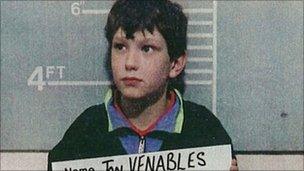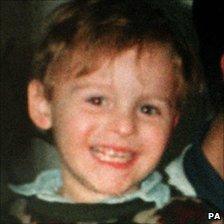Profile: Jon Venables
- Published

Venables fell into drug addiction and alcohol abuse following his release from prison in 2001
Jon Venables was just 10 years old when he and friend Robert Thompson murdered toddler James Bulger.
Venables served seven years of a life sentence for the 1993 murder before he was freed in June 2001, aged 18.
He was given a new name, a job and a flat on his release to try to ensure his security and give him an "ordinary" life.
Had he gone on to lead such a life, that might have been the last the British public ever heard about Jon Venables.
But at the age of 27, Venables finds himself back in the headlines and back behind bars having been jailed for two years after pleading guilty to charges of downloading and distributing indecent images of children.
A lifetime ban was placed on reporting anything about either his or Thompson's whereabouts or their new identities after their release.
New details
The ban relating to Venables was partially lifted on Friday at the Old Bailey after he was jailed for the offences under the 1978 Protection of Children Act.
The judge revealed that Venables had been living in Cheshire at the time of the offences, and that the case was dealt with by Cheshire police and Cheshire probation service.
It was also revealed that Cheshire police had produced a "threat assessment" to try to establish what could happen to Venables were his new identity revealed.
That assessment concluded that Venables would face the highest possible risk of being attacked if his name was either published in the media or known elsewhere in society.
Police had even trained him in counter-surveillance after he was told he would have to "live and hold a lie" for the rest of his life.
Venables worked full-time in a job with anti-social hours, earning close to the minimum wage, the court heard.
Then in 2007, he started drinking heavily and taking drugs, including cocaine and the recently-banned substance mephedrone.
On 20 September 2008, he was held on suspicion of affray over a street fight with a man who claimed Venables had attacked his girlfriend. Both men were charged with a public order offence, but this was later dropped.

James was killed a month before his third birthday
Venables was formally warned by the Probation Service for breaking a "good behaviour" clause in his licence.
Three months later, police cautioned him for possessing cocaine, and a requirement was added to his licence ordering him to address his alcohol and drug problems, the court was told.
It was not until February that it emerged Venables had been recalled to prison for breaching the conditions of his release.
The Ministry of Justice refused to reveal any details, but the then Justice Secretary Jack Straw did say the recall was prompted by "extremely serious allegations".
Venables was later charged with three offences.
The first involved downloading 57 indecent pictures of children on to his computer between February 2009 and February 2010.
The second involved distributing three indecent photographs of children in February 2010, while a third involved distributing 42 images in February 2008. He pleaded guilty to these charges.
Some of the images involved children as young as two years old and some showed the rape of young girls.
The Old Bailey also heard that in 2008 Venables had posed as a mother offering to sell her daughter for sex during three online chats.
It was on 12 February 1993 that two-year-old James Bulger was snatched from the New Strand Centre in Bootle, on Merseyside, while his mother Denise was shopping.
The moment was caught on CCTV and became the defining image of a horrific case. In the picture, it is Venables who is holding James's hand.
'Unparalleled evil'
Two days later, after a huge police search, James's battered body was found on a railway line more than two miles away.
A few days later, Venables and Thompson were arrested and charged - the youngest people to be accused of murder in the 20th Century.
They were tried as adults and made to stand in the dock away from their parents, while the judges and barristers wore full gowns and wigs. Some seven years later, the Court of Human Rights would rule that they should never have been tried in an adult court.
During the trial, the full horror of James' death emerged. He had been tortured - beaten with bricks and an iron bar. He had so many injuries it was hard to determine which had been fatal.
In court, Venables was the more emotional of the two defendants, crying openly and leaning against the shoulder of his social worker.
Both boys were said to have had difficult home lives and both had been playing truant from school on the day of the killing.
They were convicted after a 17-day trial and only then were their names and faces revealed.
Summing up, the judge, Mr Justice Morland, told them they had committed a crime of "unparalleled evil and barbarity".
But he also laid blame with their parents, calling for a public debate about "the home background, upbringing, family circumstances, parental behaviour and relationships" of children who commit "grave crimes".
- Published23 July 2010
- Published23 July 2010
- Published23 July 2010